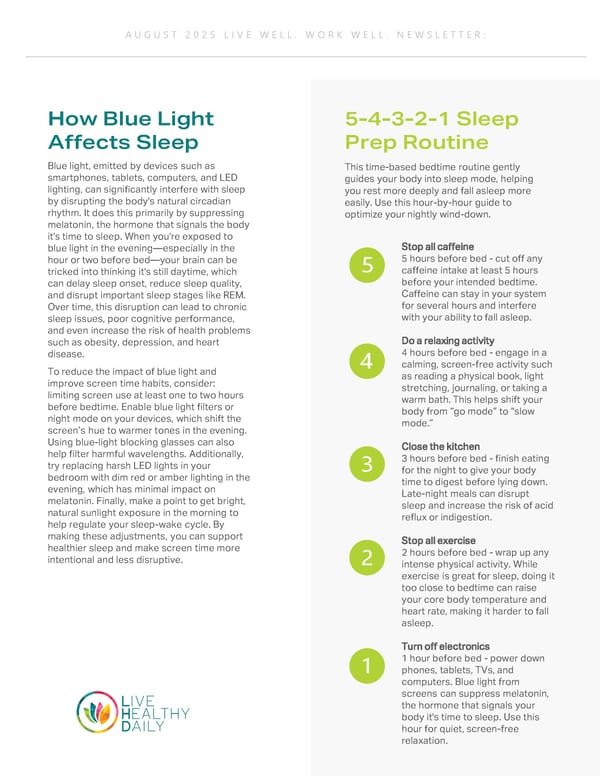A U G U S T 2 0 2 5 L I V E W E L L . W O R K W E L L . N E W S L E T T E R : How Blue Light Affects Sleep Blue light, emitted by devices such as smartphones, tablets, computers, and LED lighting, can significantly interfere with sleep by disrupting the body's natural circadian rhythm. It does this primarily by suppressing melatonin, the hormone that signals the body it's time to sleep. When you're exposed to blue light in the evening—especially in the hour or two before bed—your brain can be tricked into thinking it's still daytime, which can delay sleep onset, reduce sleep quality, and disrupt important sleep stages like REM. Over time, this disruption can lead to chronic sleep issues, poor cognitive performance, and even increase the risk of health problems such as obesity, depression, and heart disease. To reduce the impact of blue light and improve screen time habits, consider: limiting screen use at least one to two hours before bedtime. Enable blue light filters or night mode on your devices, which shift the screen’s hue to warmer tones in the evening. Using blue-light blocking glasses can also help filter harmful wavelengths. Additionally, try replacing harsh LED lights in your bedroom with dim red or amber lighting in the evening, which has minimal impact on melatonin. Finally, make a point to get bright, natural sunlight exposure in the morning to help regulate your sleep-wake cycle. By making these adjustments, you can support healthier sleep and make screen time more intentional and less disruptive. 5-4-3-2-1 Sleep Prep Routine Stop all caffeine 5 hours before bed - cut off any caffeine intake at least 5 hours before your intended bedtime. Caffeine can stay in your system for several hours and interfere with your ability to fall asleep. Do a relaxing activity 4 hours before bed - engage in a calming, screen-free activity such as reading a physical book, light stretching, journaling, or taking a warm bath. This helps shift your body from “go mode” to “slow mode.” Close the kitchen 3 hours before bed - finish eating for the night to give your body time to digest before lying down. Late-night meals can disrupt sleep and increase the risk of acid reflux or indigestion. Stop all exercise 2 hours before bed - wrap up any intense physical activity. While exercise is great for sleep, doing it too close to bedtime can raise your core body temperature and heart rate, making it harder to fall asleep. Turn off electronics 1 hour before bed - power down phones, tablets, TVs, and computers. Blue light from screens can suppress melatonin, the hormone that signals your body it's time to sleep. Use this hour for quiet, screen-free relaxation. This time-based bedtime routine gently guides your body into sleep mode, helping you rest more deeply and fall asleep more easily. Use this hour-by-hour guide to optimize your nightly wind-down.
 Sleep Tips for Long Summer Days Page 1
Sleep Tips for Long Summer Days Page 1 